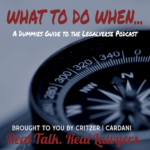What To Do When...
A Dummies Guide to the Legalverse Podcast
The objective of the What To Do When… podcast is to discuss common legal scenarios faced by everyday citizens in Virginia. Critzer and Cardani practice law throughout Virginia and focus their practice around the state’s capital of Richmond, Short Pump area in the Piedmont region. Tune in and subscribe to learn about legal topics such as Family Law, Criminal Law topics, larceny and stealing, reckless driving and also reckless driving by speeding, bad lawyers, juvenile defense, juvenile sex crimes, divorce 101, Child Support, There is Still Hope, and many others.
Welcome to What To Do When… A Dummies Guide to the Legalverse Podcast.
- What To Do When… Full Episode in Audio & Video Archives in Critzer Cardani’s BLOG.
- Subscribe and Follow the episode releases of the What To Do When… Podcast.
- Enjoy the #WTDW Video Reels & Shorts on YouTube Shorts, FaceBook, Instagram, and TikTok.
Proudly Featured on:
We will cover hot topics in the news, as well as questions we received from most of our clients, and topics that we cover in court. We might talk about what to do when: your husband leaves, or what to do when your teenager gets in trouble, what to do when you have an interaction with the police how to handle that.
We are going to be releasing the podcasts on a regular basis and we will give you an opportunity to send questions ahead of time so that we can answer your questions on the podcast as well.
We look forward to helping you in this venture and Good Luck!
Contact Us | Submit your questions for upcoming podcast topics.









